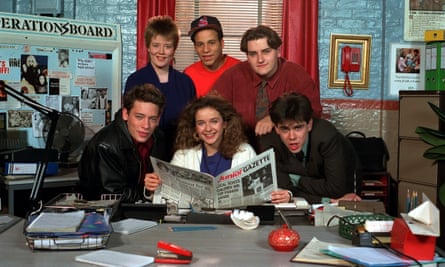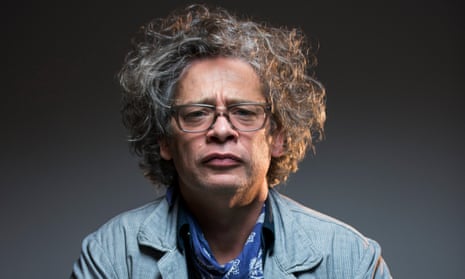It is almost unfathomable that Dexter Fletcher is 50. He’s always passed for younger. Bugsy Malone, his first film role at nine years old, had him playing a character called Baby Face, and the rest followed suit. In student journalist TV show Press Gang, he played a 17-year-old until he was 27; even in 2001’s Band Of Brothers, he was 35 playing 22. And today, sitting across from me in a Soho bar, he certainly doesn’t look his age, despite the curls of grey hair exploding from his head. “I’ve just had it styled, believe it or not,” he quips. He exudes the same boyish enthusiasm of his earlier film roles, but Fletcher has seen some dark times, too. Today he’s an unwaveringly optimistic film-maker but during the mid 1990s he almost lost it all.
Fletcher grew up in north London, acting from six years old via the drama club his mother sent him to to expel excess energy. His ascent was swift: after 1976’s Bugsy Malone came The Long Good Friday, then The Elephant Man, and by 1984 he was in Tahiti, doing The Bounty with Mel Gibson. Then in 1989 he got the part of obnoxious American teen Spike in Press Gang and decided to all but abandon his film career, staying in England for four years of TV to prolong the child’s play, spend money and snort drugs. He wasn’t paying his mortgage, wasn’t putting money aside for tax, and was buying too many cars.
In 1993, when Press Gang ended, Fletcher barely had anything left. He couldn’t get good work, and ended up presenting a series of Channel 4 videogame show GamesMaster. Watching footage of it now, it’s disconcerting to see him standing there in his combats, shouting at Patrick Moore on a giant screen. “I had so much debt,” he explains. “I chose to do it for money and I’d given up on myself in terms of ever being the person that I thought I was gonna be. I was squandering everything that I’d earned from Elephant Man onwards. I know that would have been a point where people would have gone, ‘This guy’s an interesting young actor,’ to going, ‘What the fuck is he doing?! Look at the state of him! Why would I wanna work with that guy?’
“I was at my lowest ebb,” he admits. “I didn’t give a shit about myself, obviously, any more. If I did I would have rather starved than do that. But it was through a cloud of drugs and self-loathing and all those other wonderful things that I managed to acquire.” He chuckles at the sheer awfulness of it all.
A chance meeting with Alan Rickman pointed him in a more sensible direction. At 14, he’d worked with Rickman in Stephen Poliakoff’s play The Summer Party, then in 1994 encountered him at the BBC bar. “I was off my nut on drugs, and I just remember him looking at me like this [he cocks his head curiously]. And he said, ‘Are you all right?’ I was paranoid, coked out of my head. But then I started getting the calls to meet this theatre director.” Rickman had contacted Dalia Ibelhauptaitė, who was putting on Carlo Goldoni’s The Impresario From Smyrna in the back of a pub, and suggested she audition Fletcher. She cast him, but he was still burning the wrong end of the candle and, by 1996, £90,000 in debt and living in his car, he was declared bankrupt.

That woke him up. “I had to go through a whole massive crash before I began to see things as they really were,” he says. He was dating Ibelhauptaitė, who told him he couldn’t continue his recklessness if he wanted to be with her. So he knocked the nonsense on the head. They married in 1997 and Rickman, who had quietly supported Fletcher throughout his lean years, was Fletcher’s best man. “He gave so much to me,” says Fletcher, still touched by their relationship. “He was a real friend.”
A year later, Guy Ritchie offered Fletcher the role of sensible chef Soap in Lock, Stock And Two Smoking Barrels, which saw his emergence as an adult actor and sowed seeds for Fletcher’s future directorial career. He continued acting but began developing his own projects. His debut film, 2011’s council-estate drama Wild Bill, “was a reaction for me to many films that came out post-Lock, Stock, that took the London film and shoved it into this really ugly gangstery hole that said nothing,” he says. “I love London and wanted to do a film that I felt was really about London. Like Long Good Friday is. Like Elephant Man is. Like Lock, Stock is.”
Personal themes resonate through all of Fletcher’s films. Wild Bill, starring Press Gang’s Charlie Creed-Miles, drew much from his formative experiences. Creed-Miles is Bill, fresh out of prison without the skills or inclination to look after his two young kids, leaving the work up to his eldest son, 15-year-old Dean (Will Poulter). “There’s the man who’s a boy, and the boy who’s a man,” explains Fletcher. “As a child working on film sets, I had adult responsibilities. And there’s a certain precociousness about that. Similarly, where I closed down as an adult is [because] I was used to functioning as a 13-year-old, and everything else was taken care of for me. So that’s why Wild Bill is about someone who’s not learned to take on the responsibilities of being an adult, and a kid who thinks he’s managing the responsibilities of being an adult, and therefore losing an element of himself and his childhood.”
Similarly, his Proclaimers musical Sunshine On Leith draws on Fletcher’s lost years. Following two young soldiers coming back from a traumatic time in Afghanistan and trying to fit back in, the film relates, says Fletcher, to people he knows from his partying days who would rather he were still the wild child. “But I can’t go back to that world, because I am different. I don’t connect with those people any more.”
His latest film, Eddie The Eagle, the zero-to-hero comic drama he’s directed about Cheltenham’s unlikely Olympic ski-jumper, is unashamedly crowd-pleasing, but after the script landed with him he worked hard to instil it with more humanity. Fletcher was eager to ensure Eddie didn’t come across as a laughing stock. “Eddie hears the attacks and the barbs but he goes on regardless,” he says. “He knows when someone’s fucking having a dig at him but he chooses to ignore it.”
Most importantly, Fletcher says, he just wants people to leave cinemas smiling, which is just as well after all that darkness. All three of his films are resolutely feelgood. He links this back to his relationship with the late Alan Rickman, who he says was ceaselessly encouraging. “Alan was a mentor. When I was down on myself, he would always be positive about me. It’s as easy as sniping to go, ‘Yeah but you can.’” Now he ensures he does the same with his younger cast members. “I love working with young actors like Taron [Egerton, who plays Eddie] and I want them to feel positive and good about their talent, because there were times in my life when I really didn’t, and that broke my heart. I still struggle with it, I’m racked with self-doubt and all that bollocks. But maybe that’s what’s in those films. To be positive.”
That positivity is infectious, both on-screen and off. For all its schmaltz, it would take a cold heart not to succumb to Eddie The Eagle’s charms. That Dexter Fletcher, he sure likes a good triumph.
Eddie The Eagle is in UK cinemas from Friday

Comments (…)
Sign in or create your Guardian account to join the discussion